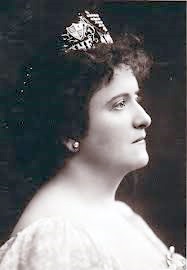
Fanny Moody was born in Fore Street, Redruth (where the post office now is) in 1866, one of 13 children of a Redruth photographer, James Moody.
While she was still at school Mrs Basset of Tehidy recognised her talent and paid for her to go to London to learn to sing properly.
Her first break came in 1887 when she sang for the Carl Rosa Opera Company's opera ‘The Bohemian Girl’. Whilst singing for them, she met and married Charles Manners who was of Irish parentage and later formed this Moody-Manners Opera Company.
She became known as ‘the Cornish Nightingale’ and was presented with a tiara with the Cornish coat of arms picked out in diamonds.
She sang under Augustus Harris at Covent Garden and Drury Lane (1890-94). Her roles included Eileen in 'The Lily of Killarney', Micaela in 'Carmen", Marguerite in 'Faust', as well as leading roles in 'La Juive', 'I Puritani' and several Wagner operas.
She travelled extensively abroad and sang the songs from home to the Cornish exiles and for the miners in South Africa in 1896.